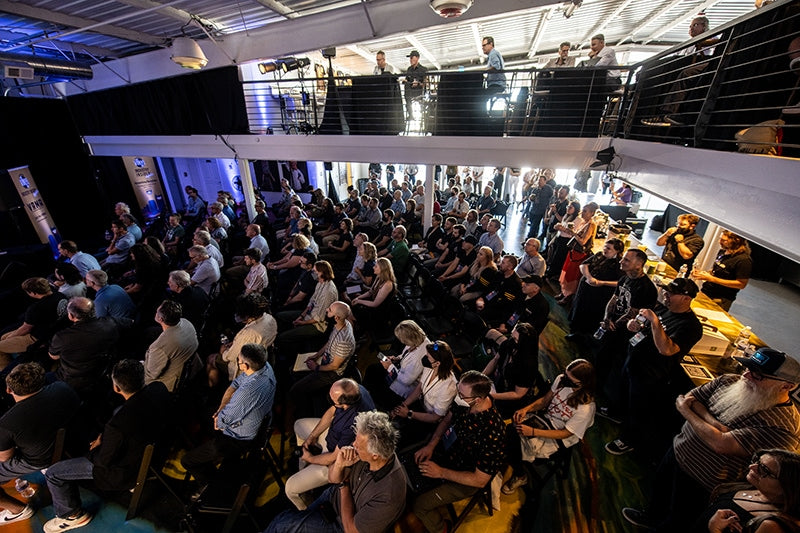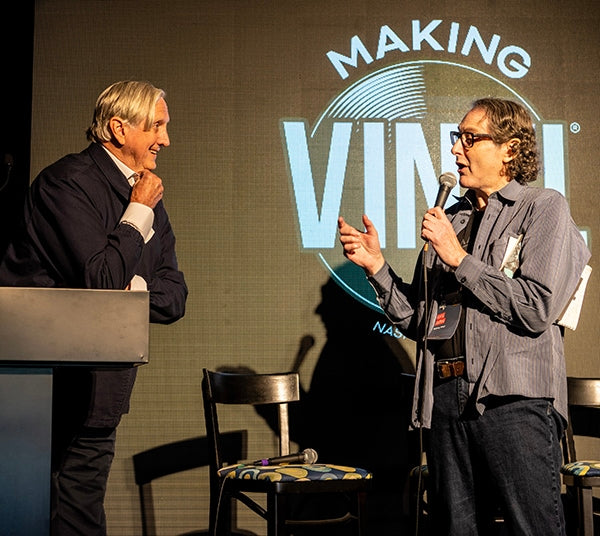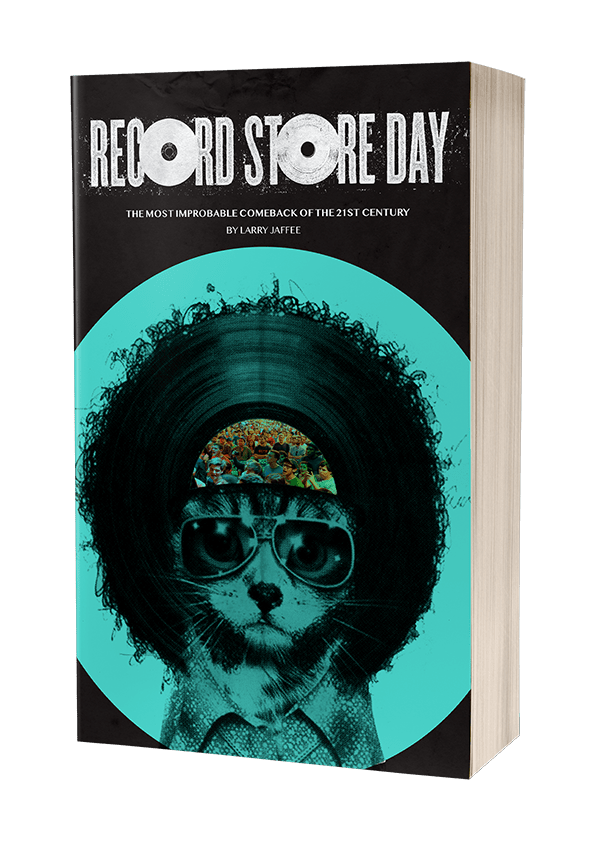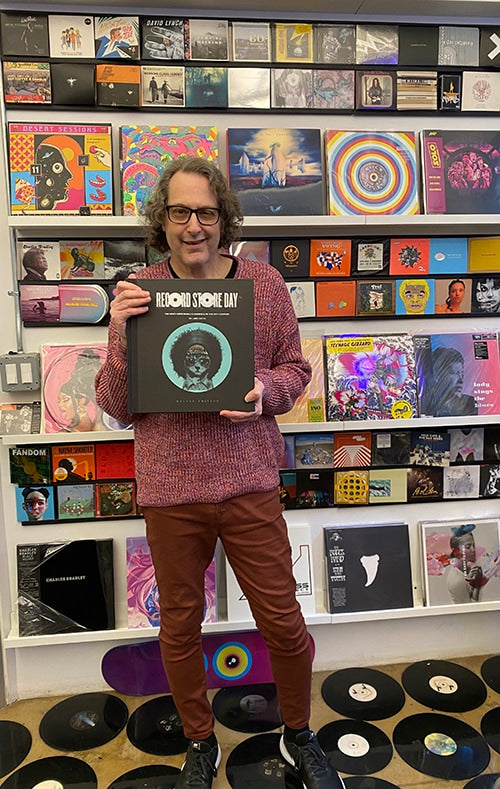Copper contributor Larry Jaffee is the co-founder of Making Vinyl, an industry organization dedicated to fostering cooperation among those in the record-manufacturing industry. Larry is also the author of Record Store Day: The Most Improbable Comeback of the 21st Century. I talked with him about the origins of Making Vinyl and Record Store Day, the state of vinyl today, and much more.
Frank Doris: How did Making Vinyl come into being, and what’s it all about?
Larry Jaffee: Bryan Ekus and I had been working together since about 2006 in various projects, some of them involving DVDs and CDs. I [had] stopped buying vinyl regularly – I was all in on the CD era because I was editing a trade magazine called Replication News, later Medialine.
The business was changing radically and everything was going towards digital [streaming and downloads]. I was reassessing my life and career. I decided to sell my record collection in 2010; I was moving and just wanted to downsize. I told a friend of mine and he was like, you did what? (laughs) At that point it didn’t really occur to me that I had done the wrong thing.
FD: I don’t think anybody would have thought that, at that time.
LJ: I did keep kept two boxes of records that were the most valuable stuff.
In 2013, a friend of mine sent me a PDF of a UK magazine about vinyl. Until then, it had never really occurred to me that vinyl was back. Then I met Tim Clair, owner of Record Reserve [on Long Island, New York] around June 2012. And in the dollar bin, I saw this jazz burlesque record from the early Sixties on Cameo Parkway. I bought it, put it on and I was like, “I’m back. I love this. Why did I [get out of vinyl?] Fast forward a little and I told Bryan, “maybe we should do a vinyl conference.” He thought it was too much, too soon. And in retrospect, he was probably right. So, we let it just sort of gel for a couple of years. Then he called me in the beginning of 2017. He said, “um, you remember that idea you had about doing a vinyl conference? I think we’re gonna do it.”
One of the reasons why Bryan thought the time was right was that he was the head of a group called the Colonial Purchasing Cooperative, which buys bulk raw materials for CD and DVD manufacturers, such as the plastic polycarbonate, and packaging. One of Colonial’s board members was Steve Sheldon from Rainbo Records in Santa Monica, which closed in January 2021 but previously was the oldest pressing plant in the U.S. I guess Steve might have said something to Bryan around that time about vinyl going pretty well at Rainbo.
I introduced Bryan to Michael Kurtz from Record Store Day [which had started in 2008]. I said to Bryan, “The industry knows you and me from the CD and DVD business. They don’t really know us from the vinyl world. We really need Record Store Day’s endorsement for the event, which I named “Making Vinyl.” There appeared to be some synergy. Michael and I were already friends, and we went to dinner with Steve Sheldon [and started to put plans in place].
Initially we were thinking about doing the Making Vinyl conference in Nashville but the hotels just weren’t available. So, Bryan asked what I thought about doing it in Detroit. I told him Detroit was a lot better because Jack White [of the White Stripes, the Raconteurs, solo, and others) just opened this factory there in February 2017. If we could get his seal of approval on Making Vinyl, it would be a big plus. Steve Sheldon was able to get a message to Ben Blackwell from Third Man Records [Jack White’s label], who got it to Jack. I was in Toronto on vacation at a baseball game with my kids – the Yankees were playing the Blue Jays – and I received an email from Ben who said that Jack really liked the idea.
FD: So, you and Bryan reached out to people from manufacturers, pressing plants and so on.
LJ: Yes, we knew who the biggest plants were, like United Record Pressing in Nashville, and Bryan had a few European contacts, who came over for the Detroit event. Executives from the big German plant Optimal Media, MPO in France, and GZ Vinyl in the Czech Republic – the biggest vinyl factory in the world – to join Steve from Rainbo and Don MacInnis from Record Technology, Inc., which presses audiophile-quality records.
We also learned about six or seven vinyl pressing companies that had recently opened or were about to do, such as Furnace Record Pressing in Virginia, Memphis Record Pressing, SunPress Vinyl in Miami, and Microforum in Toronto, not to mention, of course, Jack White’s Third Man Pressing. Jack White was interviewed by Ben Blackwell about why and how they opened the plant, and it was amazing. We ended up drawing almost 300 attendees. We realized we were on to something at that point. We thought, how do we top this? What happened was, the industry kept growing, and Little Steven Van Zandt keynoted in 2018.

Attendance was good at this Making Vinyl Nashville 2022 seminar at The Vinyl Lab. Courtesy of Michael Weintrob.
FD: Why did you decide you should create this organization?
LJ: We felt there was a need for a networking platform for people to meet each other. What we’ve learned is that vinyl manufacturing is different from the CD [manufacturing] business because that business became very cutthroat, dog eat dog, very price competitive. Vinyl is so different because it’s so expensive to get into it. The margins suck all the way around the value chain, and those in it help each other whenever they can.
FD: Can you give us any news highlights from the 2022 Making Vinyl conference in Nashville? Especially since COVID had shut things down previously.
LJ: We did a virtual event in December, 2020 as something of a pandemic stopgap. Regarding Nashville in 2022, we [now] look like geniuses that we chose to do it there because Jack White in March made a video plea for the major labels to get back into the pressing business themselves because the bottleneck of waiting for records [to be pressed for] as much as a year is unfair to musicians. Since Jack made that announcement, all these other companies have started talking about major expansion, such as United Record Pressing basically doubling their capacity in Nashville. The previously mentioned GZ Vinyl is opening Nashville Record Pressing and it also is part owner of Memphis Record Pressing, and is doubling its capacity. In addition, longtime vinyl mastering/cutting engineer Piper Payne had recently opened Physical Music Products, a Nashville facility. We held the June conference at a brand-new boutique facility with one press, The Vinyl Lab, which is also a performance venue.
At Making Vinyl, the record club Vinyl Me, Please announced they were going to open up a plant in Denver with partners, including musician Dave Rawlings and Gary Salstrom, who had run Quality Record Pressings in Salina, Kansas. Also announced at Making Vinyl was the opening of a Minneapolis plant by Copycat Media, whose parent company the ADS Group is among the largest CD replicators. So, while Jack asked the majors to get into the business, we found that there was this whole new focus on pressing capacity that has stepped up substantially in the past six months or so. Some of that is just coming online.
FD: There’s been some concern that in the wake of the Apollo Masters lacquer factory fire in February 2020, there would be a shortage of lacquers, but I heard that that was discussed at the conference, and in fact, it’s not a concern.
LJ: Yes. The Japanese supplier MDC stepped up their production and has managed to satisfy all the global needs, which I find amazing.
We ended the Making Vinyl event with T-Bone Burnett talking about his Ionic Original acetate technology that basically fortifies the disc [with a durable coating]. What is really interesting is that he claims that the sound quality improves after every play, as opposed to being degraded [like you’d have with standard acetate discs]. And T-Bone talked about the plan to auction off a recent Bob Dylan re-recording of “Blowing in the Wind” using this technology. [The one-of-a-kind disc was auctioned at Christie’s on July 7, 2022 for $1,769,508.]

T-Bone Burnett and Larry Jaffee at Making Vinyl Nashville, 2022. Courtesy of Michael Weintrob.
FD: Let’s go to another topic. There’s always been concern from savvy record buyers about the quality of new vinyl, going back to the 1970s when companies started to use recycled vinyl. But these concerns have carried into today. I just bought a new disc that has a pop on side one. Could you comment on that?
LJ: I think part of it that is there is a rush to get records out the door as fast as possible. That’s not to say quality control has completely gone away. I guess it depends on the plant. Some plants have better reputations than others. Labels like Resonance Records release great jazz records on newly-pressed vinyl.
Beyond the cutting and the mastering, plating is also extremely important. And, is it pure vinyl or is it reground vinyl? Does colored vinyl play a role in sound quality? I also think that the manufacturing of colored vinyl discs has actually screwed up the business in terms of creating production bottlenecks. It’s time-consuming to have to take off the molds and change the pellets [from regular to colored vinyl] and all that stuff.
Part Two of this interview will focus on Record Store Day, more realities of record manufacturing in the present day, and the mentality of audiophiles versus collectors and record buyers young and old.

Record Store Day, book cover.
Header image courtesy of Stacy Karp, A to Z Media.



